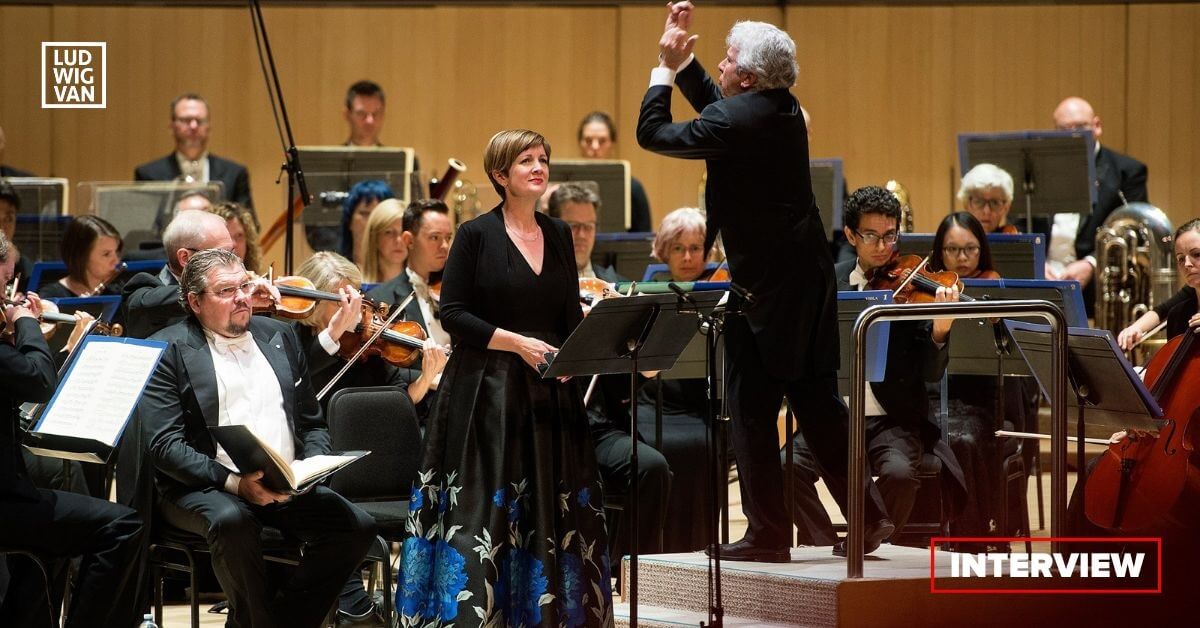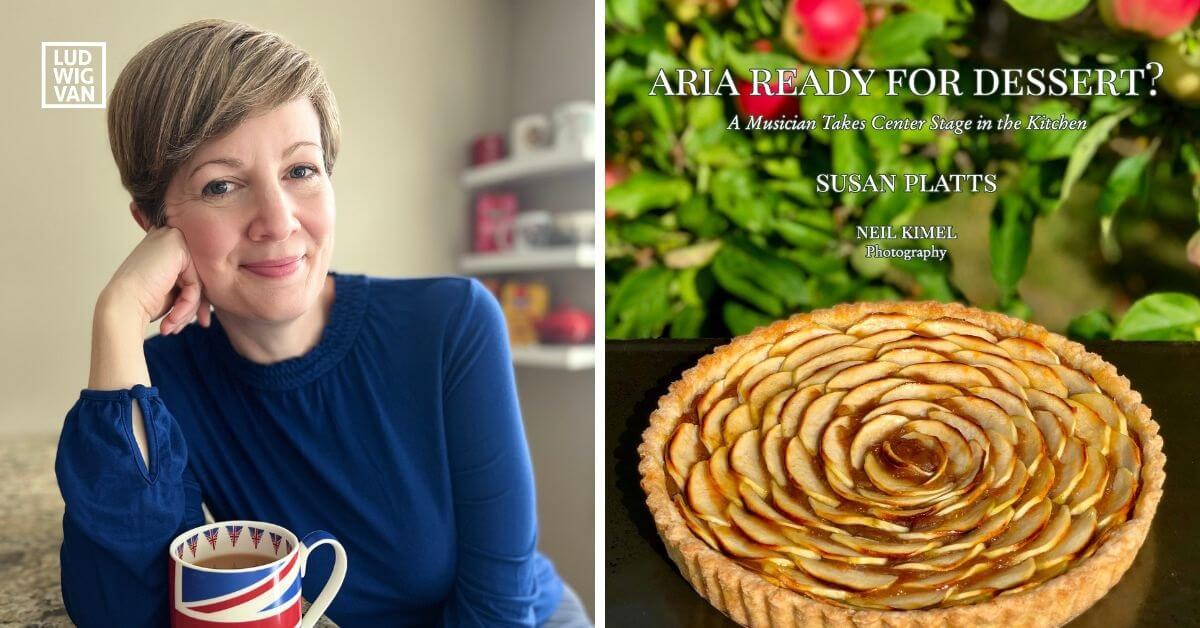
Canadian mezzo-soprano Susan Platts, 49, will be giving her first post-pandemic performance in Toronto with the TSO in Mozart’s beloved Requiem (Jan. 11 to 15). She is part of a very high-powered cast that includes Jane Archibald, soprano, Isaiah Bell, tenor and Kevin Deas, bass-baritone, under the helm of British conductor Michael Francis.
You can, however, also find Platts on Amazon where her new cookbook, cleverly called Aria Ready For Dessert? is on sale.
So how does a mezzo-soprano with a 25-year distinguished career come to write a cookbook?
For that answer, Platts and I connected by Zoom to talk about both her career and baking, and it turns out that both involve interesting stories. When we spoke, the singer was visiting family in Victoria, her home town. She currently lives in Evanston, Illinois, outside Chicago, with husband Neil Kimel, second horn with the Lyric Opera Orchestra.
The Career
Do you come from a musical family?
My parents, who are from Manchester, loved English folk music, and they loved to sing. My father played the guitar, banjo and mandolin by ear, while my mother was also self-taught on guitar and piano.
Yet you were never sent for music lessons.
That’s right. I always thought I’d go into the visual arts. I was particularly interested in graphic arts. It was my Grade 11 choir teacher who first noticed that I had a nice voice. That’s when I started to study singing privately.
The usual route to a career for a classical singer is music at university followed by opera school, but that’s not your story.
Because I started late, I felt I didn’t have enough of a music education to go to university, so my career was forged by private studies in voice, piano and music history. I spent two summers at Mozarteum University in Salzburg, and they were inspiring times. You could see concerts by Bryn Terfel and Teresa Berganza, who, by the way, wore sneakers under her gown!
You had some high-powered mentors like Christa Ludwig and Jessye Norman. How did that come to be?
In the case of Christa, my mother helped. She’s a librarian and researcher extraordinaire, and can find anything. She discovered who Christa’s London agent was, so I sent tapes and a letter asking to study with her. Six months later, I got a fax that said she was willing to take me.
And Jessye?
I got to Jessye through the Rolex Arts Initiative, which pairs young artists with a mentor. Four applicants were sent to Jesse and she chose me. I spent a year with her, and stayed close with her until her death. She’d even come to my concerts. In fact, her support was incredible.
Legendary broadcaster and choir master Howard Dyck was also instrumental in your career, was he not?
My mother used her research skills again to get a contact for Howard, and he asked for a tape. He was very enthusiastic about my voice and used me a lot as a soloist with his various choirs. He also gave a tape to conductor Helmut Rilling, and through that I got an agent. In those days, someone could tell an agent about an artist and you’d end up on the roster.
Unlike most classical singers, you don’t really have an opera career. You seemed to be anchored in the concert circuit, where you are particularly known as a Mahler specialist.
I have done some opera, and I enjoyed it, but I have to feel that I can fit the music emotionally and vocally. Because I have a rich sound, that means that Mahler and Brahms are in my comfort zone. There is, however, some mezzo stuff that I can’t sing, like Messiah. The coloratura of Bach is in my comfort zone, because it is a tad higher than Handel, where my voice sets at the passagio. I do a lot of Bach, but Romantic music is really my thing, both oratorio and symphonic. I’m kept very busy with a concert career, and it also means shorter periods of time away from home. If Mahler had written operas, I’d sing opera.
Mahler is 80% of your career. What is it about his music that is so appealing?
Mahler is life. You feel that when you are inside his music. Some people think that Mahler is depressing, but for me, he faces emotion head on. No matter where you are in your life’s journey, you can relate to Mahler, particularly, the older one gets. I was meant to sing him, and my love for his music just keeps growing. Besides, every conductor is different so the piece is always new.
Since Mahler is such a part of your life, does he figure into your baking?
When I was studying in Salzburg, I fell in love with the confection known as Bachwürfel. Because you can only get them in Austria, I was determined to learn how to make them. Since Mahler loved jam — he’d have a different kind every day of the week — I put a layer of jam into the Bachwürfel to turn it into the Mahler Würfel. So you see, I can work Mahler into anything.
Susan Platts sings Mahler’s Lieder eines fahrenden Gesellen No. 1 with the Orquesta Filarmónica de Bogotá and Carlos Miguel Prieto, conductor, in 2018.
The Cookbook
Were you always interested in baking?
I’ve always loved baking and cooking. It is also related to my interest in the visual arts. It’s like painting to me — the art of making beautiful and tasty things. I’ve always been able to make up recipes, or modify other ones. I am also good at tasting something, and then recreating it. I love a good challenge.
Can you give me some examples of your creative baking?
For example, in a sushi restaurant, I tasted coffee jello, and I figured out how to make it. My matcha mint cake cookies are inspired by a matcha mint tea latte that I had in South Africa. Or, I combined the recipes for custard creams and Jammie dodgers, to make custard dodgers. That’s my motto. Find recipes you like and make them your own, although, I still have bakes that don’t turn out.
You seem particularly interested in British desserts.
I was born in Britain. My family immigrated when I was two. When I was little, I had my own little pots and pans, and I’d help out my mother, who was a very good baker and cook. We’d make things like scones, sticky toffee pudding and Bakewell tarts, so that’s why there are traditional recipes in the cookbook, with my own twist, of course. There are a few apple desserts because I spent part of the lockdown at my Dad’s house in Victoria, and he had apple trees.

Did you really at one time audition for ‘The Great American Baking Show’?
I did, and I made it to the final 19. I was flown to Los Angeles where there was a live bake with tastings. You had to come with two of your own cakes and a recipe for bread. It was pretty intense. I was told I should apply again, but I didn’t bother.
How did the cookbook come about?
Both my sister and my husband suggested that I do one during the pandemic, because my singing contracts were cancelled, and I was facing empty days. The recipes are ones that I have gathered over my lifetime. I’m an eclectic collector, but they are all pretty straightforward. You don’t have to be a good cook. For example, I’m not going to win awards from Italy for my tiramisu, but it’s easy.
Sugar, or lack thereof, is at the heart of the desserts in the cookbook.
About 12 years ago, my mother had cancer, and getting her to eat nutritionally became a passion project for me and my sister Ruth. We did a lot of research and discovered the theory that refined sugar can feed cancer cells. The first thing was cutting sugar, and compensating by upping the vanilla content, without compromising the sweetness or integrity of the dessert. So the recipes were born out of wanting less sugar, but, of course, people can add more sugar if the dessert is not sweet enough for them. And, mom is still with us, and my sister and I are still careful about what we put in our bodies.
Your recipes are set up differently than other cookbooks.
Absolutely. I hate having to scroll up and down between the ingredient volumes and the method. That’s why I include all the volumes in the ingredient list, and repeat the volumes in the method.
Who came up with the clever title ‘Aria You Ready For Dessert’?
My sister. We had all kinds of suggestions but that was the best
You also suggest musical pairings, which I find delightful. The music can be played while baking, or when serving the dessert.
My husband dived down the rabbit hole to do the research. Every recipe has a pairing. For example, blueberry crumble bars are paired with Grieg’s Blabaeret (which means blueberry in Norwegian). Apple tart, of course, gets Rossini’s William Tell Overture.
You self-published the book?
Yes. It’s a passion project, and I’m proud of it. It represents me, and my two worlds coming together. I printed 200 copies and they are almost all gone, so people are buying it.
I think your Tips and Bits section is terrific. I found a lot in there that is really helpful, like how to bring eggs and butter to room temperature.
I thought it would be good to include truths that I have learned over the years.
Tell me about your website www.bakingbitsandbobs.com.
It’s a continuation of the cookbook. It’s a food blog that allows me to continue my passion for baking and all things British.
The photographs in the book are absolutely gorgeous. Your husband, Neil Kimel, did a great job.
And just think. He took all the pictures on an iPhone!
#LUDWIGVAN
Get the daily arts news straight to your inbox.



